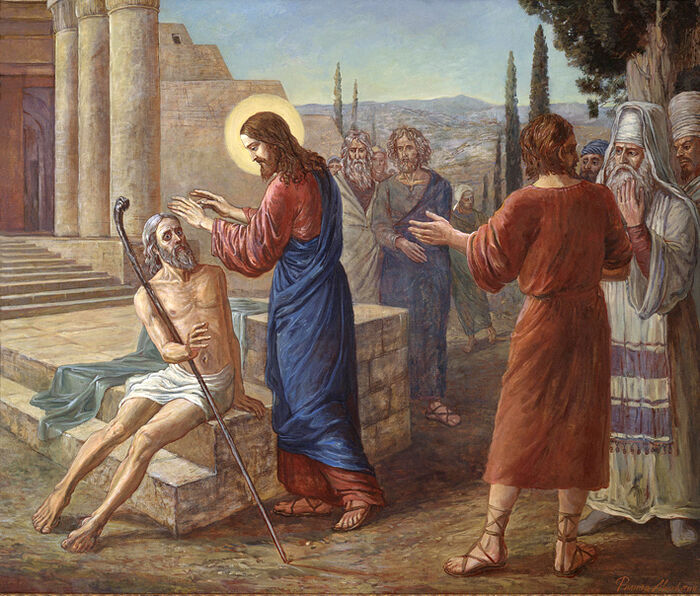It may seem too obvious to mention, but we must remember that our Lord ministered to people at their point of greatest need. He did not congratulate them for their self-sufficiency or distract them from facing uncomfortable truths, but healed them of their deepest infirmities. He raised them up from the low points of their weakness and despair. His blessing was not spiritual icing on the cake for people whose lives were characterized by unbroken success and the admiration of others. Those who opened themselves to receive His mercy already knew their own brokenness and pain. They had the spiritual vision to perceive their need with clarity beyond what is possible for those who think that they are doing just fine and can save themselves.
The situation of the blind beggar in today’s gospel reading was obviously very precarious. In that time and place, all that he could do to support himself was to sit by the side of the road and beg. He surely had no illusions about his circumstances, for he was defined by his disability and people surely thought of him as just another blind beggar. When told that the Savior was passing by, the poor man must have known that this was his one chance for healing and a new life. That is why He refused to stop calling out loudly for Christ’s help even when others criticized him, saying “Son of David, have mercy on me!” The more they criticized him, the louder he shouted. He was neither crazy nor rude, but was determined to do what was necessary to receive the Lord’s mercy. After Christ restored his sight, the man followed Him and gave thanks to God.
Unlike the blind beggar, we often lack a sense of urgency about presenting ourselves to Christ for healing. Perhaps that is because we lack the spiritual vision to see our deepest needs with clarity. Since we are not literally blind and destitute, it is much easier for us to ignore our true state than it was for him. Opportunities for distraction are all around us, from our cell phones to our work, family responsibilities, and entertainment. In an affluent society, we can easily wrap ourselves in a warm blanket of creature comforts and use ample food and drink in ways that ease our pains and encourage us to become content with passing pleasures. We easily fall prey to the temptation to exalt ourselves in our own minds in light of whatever status we think we have due to our education, profession, wealth, physical appearance, or other accomplishments and abilities. We may define ourselves according to some national, political, or social identity that we imagine exalts us above overs. We may have accepted our culture’s conventional wisdom that possessions, power, and pleasure are more real than God. We do not lack for opportunities to convince ourselves that spiritual blindness is a problem only for other people or that it is really not a problem at all, even when we are doing nothing other than stumbling around in the dark.
In order to become more like the man whose sight was restored, we must follow his example by ignoring our own passionate thoughts and the words of others which suggest that there is anything more urgent than opening ourselves to receive the Savior’s healing as we share more fully in His blessed life. All kinds of responsibilities and concerns may seem more pressing than responding to that calling, but even though we live fairly conventional lives in society, we may still “lay aside all earthly cares” as we make our duties opportunities to serve Christ in our neighbors. We open the eyes of our souls at least a bit to the light of Christ whenever we turn away from the blindness of serving only ourselves. The daily struggle to do so will surely help us see more clearly the darkness that is in us. Instead of being discouraged, however, we must then become even more like the blind beggar in persistently calling out for the Lord’s healing mercy.
If we remain obsessed with what other people think about us or how we measure up according to some cultural standard of success or wellbeing, our focus will be on something other than the healing of our souls. In order to gain spiritual clarity, we must cultivate the humility to know that we do not need praise, popularity, or the world’s approval, but instead mercy, healing, and light that we cannot give ourselves. Before the infinite brilliance of God, we are all merely blind beggars. We must learn to see our excuses for remaining blind as simply that: excuses to remain in the dark.
St. Paul saw himself clearly as the chief of sinners. He had been a highly respected Pharisee and persecutor of Christians before the Risen Lord appeared to him on the road to Damascus. Surely, everyone who knew Paul at that point in his life thought that he was a complete fool for becoming a follower of Christ. He wrote that he “received mercy for this reason that in me, as the foremost, Jesus Christ might display His perfect patience for an example to those who were to believe in Him for eternal life.” (1 Tim. 1:15-16) He acquired the humility to proclaim that, if the Lord’s mercy extended even to someone like him, then there is hope for us all. Absolutely no one has to remain blind.
There is no way for us to follow St. Paul’s blessed example other than taking difficult steps of faithfulness which no one else can really see. No one but God knows if we are mindful in daily prayer, if we reject tempting thoughts, and if we shut our eyes and our ears to whatever inflames our passions. We must pray, fast, and give of our time and resources to those in need in secret as much as humanly possible, refusing to do so in order to gain the praise of others or to build ourselves up in our own minds. We must also ignore the criticism of other people and our own doubting thoughts when we refuse to treat our neighbors as anything less than living icons of Christ, regardless of where they stand according to the standards of this world or how they treat or speak about us. When we refuse to make money, possessions, social standing, and physical appearance our false gods, we may well look like failures in the eyes of many. When we place loyalty to the Kingdom of God before service to any of the petty kingdoms or agendas of this world, some will call us fools or traitors.
Those who are truly finding the healing of their souls in Christ will shine brightly in contrast to the darkness that so easily takes root in our hearts. By God’s grace, we must all become so focused on gaining the spiritual vision to behold the glory of Jesus Christ that we appear as foolish by worldly standards as a blind beggar causing a disturbance or a former Pharisee becoming the apostle to the Gentiles. Doing so requires a daily struggle to purify our hearts and reorient our deepest desires for fulfillment in God. The first step on that journey is to recognize our blindness and to call out with persistent humility for the mercy of our Lord, God, and Savior Jesus Christ. Every single one of us must do that every day of our lives if we are to know the healing and restoration of the miserable beggar who received his sight through faith in the Lord. Let us not despair even when the darkness threatens to overwhelm us, but instead mindfully open our hearts to the light of Christ as we trust that He will minister to us at our point of greatest need and make us participants in His salvation.





